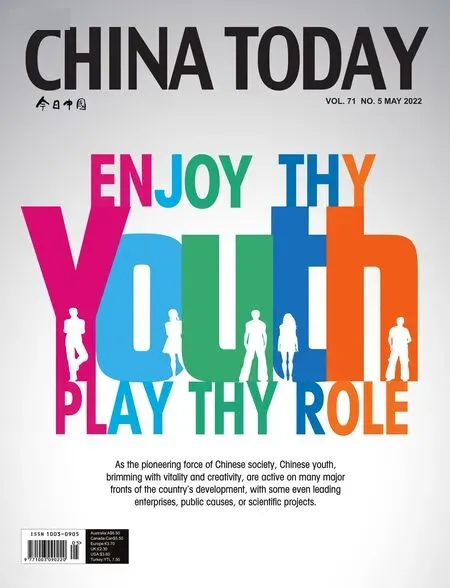RMB 1 Trillion of Surplus Profits
The People’s Bank of China has turned over a total of over RMB 1 trillion of surplus profits to the central government in accordance with the law.The amount of money will mainly be used to offset tax rebates, increase transfer payments to local governments, stabilize employments, and ensure people’s well-being.
Energy Targets to Be Reached by 2025
China has set targets to ensure energy security, transformation toward low-carbon, and high-quality economic and social development during the 14th Five-Year Plan Period(2021-25).

Energy Security to Be Improved
Over 4.6 billion tons of standard coal will be produced every year, the annual output of crude oil will be stabilized at around 200 million tons, and the annual output of natural gas will top 230 billion cubic meters.

Transformation toward Low-carbon Development to Yield Remarkable Results
Carbon dioxide emissions per unit of GDP are expected to fall by 18%in five years.
Shares of non-fossil energy consumption are expected to rise to about 20%.
Shares of electricity generation from non-fossil energy are expected to reach about 39%.
Shares of electricity in terminal energy consumption are expected to be raised to about 30%.

Efficiency of the Energy System to Be Greatly Improved
Energy consumption per unit of GDP will drop by 13.5%in five years.
COVID-19 Vaccine Costs Fully Covered by Medical Insurance Funds and National Finance

Since the outbreak of COVID-19, the National Healthcare Security Administration (NHSA) has always put people and their well-being first.In February 2021, China officially launched the initiative of COVID-19 vaccines for residents free of charge.
Currently, China has administered 3.2 billion doses of vaccines.The procurement and vaccination costs till now are over RMB 120 billion and have been mainly borne by the medical insurance funds and public funds.
At the beginning, when there was insufficient production capacity, NHSA played the role of a negotiator with domestic manufacturers and reduced the purchase price of inactivated vaccines to no more than RMB 90 per dose in the first round of negotiation, which was lower than the international prices.The negotiated pricing has continued its downward trend, first dropping to RMB 40 per dose and then to RMB 20, and is expected to be much lower in the future.
SASAC to Reduce Rent for Small and Micro Businesses and Self-employed Entrepreneurs

China’s centrally-administered state-owned enterprises are required to reduce or exempt six months of rent for small and micro businesses and self-employed entrepreneurs that rent their houses in any county marked as a high-risk area in epidemic prevention and control, according to a circular released recently by the State-Owned Assets Supervision and Administration Commission(SASAC) of the State Council.In other areas, three months of rent will be waived.
New Grain Production Policies Unveiled

China has introduced a series of policies to boost grain production this year, according to the Ministry of Agriculture and Rural Affairs and the Ministry of Finance.
The country will issue onetime subsidies for farmers to help them cope with increasing expenditures caused by price hikes of agricultural supplies.The ministries will continue to support the development of 6.67 million hectares of highstandard farmland, and provide subsidies for the purchase and application of agricultural machinery.Subsidies shall also be offered for corn and soybean planting, and the minimum purchase price for rice and wheat will be raised to protect farmers’interests.
Meanwhile, the ministries called for building industrial parks and clusters for grain and oil production, thus forming integrated industrial chains.Disaster relief funds will be increased.
China Takes Measures to Stabilize Foreign Trade and Investment

To deal with the complicated, grim situation facing foreign trade and foreign investment, the China Council for the Promotion of International Trade (CCPIT) is planning to mobilize sub-councils across the country to take various measures, according to a CCPIT spokesman.
As reported by foreign trade enterprises, the main problems bothering them include the following: high sea freight charges, the continually rising prices of energy and raw materials, bottlenecks in global supply chains such as the shortage of chips and other important materials, and uncertainties caused by the Russia-Ukraine conflict.
Statistics from CCPIT show that in 2021, China’s outbound investment grew by 2.2 percent year-on-year.Among the new risks and challenges now faced by Chinese enterprises in their overseas investments, the epidemic and political instabilities are the most pressing non-commercial factors.
Program Launched to Help Women

The Supreme People’s Procuratorate and All-China Women’s Federation launched a program to provide legal aid for women in need, which will run till the end of this year.
This program targets five groups of women: those at risk of slipping back into poverty,victims of domestic violence,abduction and sex crimes, sole providers of their families, women of poor health or with disabilities, elderly women without a family or whose family cannot support them.
For women who still face difficulties after judicial remedies are implemented, the Supreme People’s Procuratorate and All-China Women’s Federation will coordinate with other authorities to provide targeted help.A monthly meeting mechanism will be put in place to share aid information, solve prominent problems, and hence better protect the legitimate rights and interests of women.

